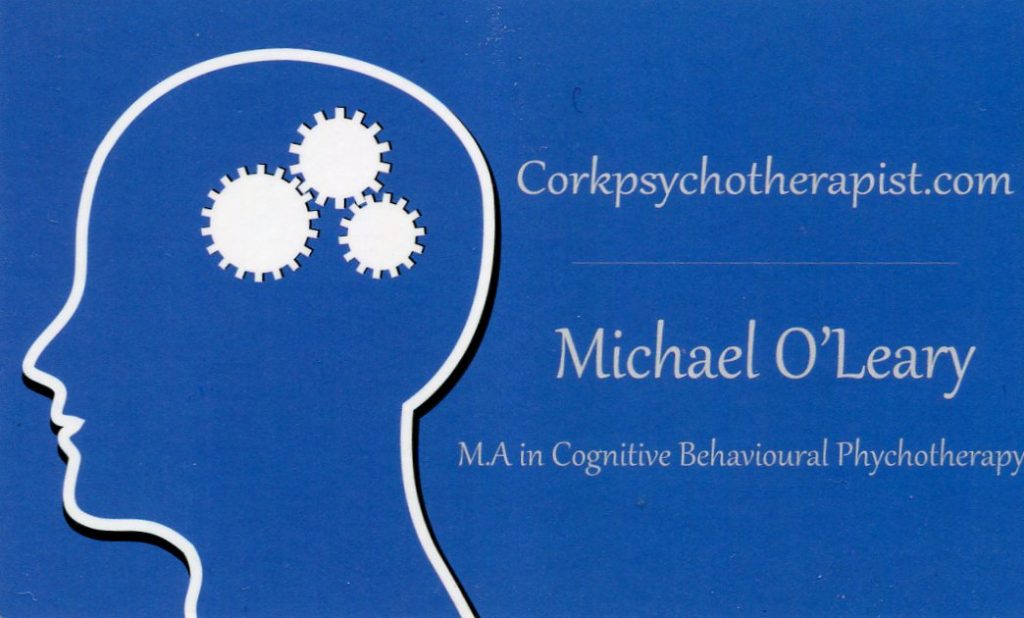
Michael O’Leary is a well known Cognitive Behaviour Therapist in a wide area of Cork city and county. He has developed and expanded his practice year on year since he retired from his position as CBT therapist in primary care with the West Cork Mental Health Services, a post he held for the previous four years. Michael’s practice now covers a huge geographical area of Co Cork, stretching from Bishopstown in the western suburbs of Cork city to Glengarriff in West Cork and at his home office in Terelton, Macroom. Weekly clinics are held in each of these locations. We spoke to him to gain a further insight into his theoretical approach with his clients, stigma surrounding mental ill health and what clients can expect from sessions with him.
Tell us a little bit about how you got into the job:
Back in the day, I qualified as a registered psychiatric nurse. I worked with the Southern Health Board in the capacity of a psychiatric nurse. I later transferred to the West Cork Mental Health Services. At that stage, I undertook further studies, gaining a certificate in reality therapy, a Higher Diploma in psychiatric nursing and later a Masters Degree in cognitive behaviour therapy (CBT). I worked in the acute mental health services and later as a clinical nurse specialist in primary care using CBT. In 2012 I expanded my private practice to Ballincollig, Bishopstown, Glengarriff and at my home base in Terelton, Macroom.
What type of clinical approaches do you use with your clients and why?
My qualifications are in CBT, however, I now specialise in acceptance and commitment therapy(ACT) which is a more focussed, time-limited and cost-effective model of therapy. In this model of therapy, we focus on thoughts, feelings, body sensations and behaviours. The average number of sessions required to cover the course is usually four or five sessions.
What role, if any, do you believe social media has played in benefiting or negatively impacting people’s mental health?
I believe social media has its advantages and like everything in life, it also has its disadvantages. One important use it has, it keeps people connected. However, there is no doubt that some people spend a disproportionate amount of time scrolling through messages and news. When this happens some become disconnected from their family, friends and their environment.
Apart from seeking professional help, in what other ways can people mind their mental health?
We can all protect our mental health by taking a moderate and open attitude to work, leisure, social activities and self care.
What are the best and worst aspects of your job?
The best aspect of my work is when the client and I are fully engaged in a joint effort to work through whatever problems or issues that cause this person to present for therapy. The worst aspect is where the client is unable to commit fully to the process, for whatever reason.
When should people consider seeking therapy?
This can vary from person to person. However, if we feel unfulfilled in any area of our life, therapy can help us reframe our attitude and perspective in the bigger picture of life. Change, for instance, can often bring about stress and anxiety. Work problems, health issues and problematic relationships can also start a downward spiral of stress low mood and depression. When any of the above surface, it’s time to seek professional help.
What do you think is your greatest strength as a psychotherapist?
My strength is entwined with my life experiences. I’m a husband, father and grandfather. I have worked in the public services and I was also self- employed for many years. I have years of exposure to many and varied presentations of mental health. I also believe that all humankind tries to do the best they can in whatever life brings to them.
The conversation surrounding mental health is becoming increasingly more open in Irish society, however there can still be a stigma around seeking professional help. How best can someone experiencing feelings of shame overcome this and take the first step in contacting a therapist?
Yes, there is still a stigma surrounding mental ill health. What I would say to anyone needing help is: first acknowledge you’re human- and we humans are not perfect. You’re are not the only one experiencing anxiety, low mood or whatever. Secondly, visit your G.P and be open to their help and advice.
What can people expect from the initial session when they come to you?
Empathy, understanding, active listening, and a commitment to work with this person.
What’s the best piece of advice you’ve ever received?
Practice on a daily basis to make my needs known appropriately.
Cork Psychotherapist
Russsnakilla, Terelton, Macroom, Co. Cork
M 085 724 6044
michaeloleary6054@hotmail.com
www.corkpsychotherapist.com







